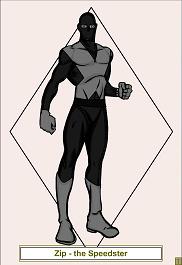New Marvel Super Heroes Campaign
For the past about eight weeks, I’ve been running a Marvel Super Heroes campaign. It’s been fun. But one of the other players in the group has mentioned he has an idea for a MSH campaign. I’d love to play a character again, so we decided to give his game a go.
We’ll be playing young mutants, new recruits for Professor Charles Xavier’s School for Gifted Youngsters. Here’s my character:

Montesse, Wyoming. Nothing to do in the High Plains, for Zip, but run, run, run. He has actually somewhat embraced being a mutant — likes his ability, and being out in the middle of nowhere, he hasn’t really experienced much anti-mutant bigotry. He also wants to be a hero, but in ranch-land Wyoming, there’s not much to do in that line of work — find lost calves, run sick dogs to the vet, check fences, run into town for a new part for the truck, etc. Pretty darn pathetic.
Mom and Dad are ranchers, older brother in college, younger sister in grade school. Zip is excited about being invited to Professor Xavier’s school. He’s likely to sneak out after curfew to get into troub. . . er, go on hero patrol (or a fast-food snack). He’s already picked out a hero costume. “No, that’s not an ‘X’, it’s arrows.”
His metabolism is very high — he eats several times as much as a normal 16 year old his size. He loves fast food (of course, pun intended), and most of his money goes towards that. 16 years old — he doesn’t have a driver’s license. ‘Cause, why would he need one? He can outrun the truck on foot.
His civilian clothes always includes a baseball cap — he has a dozen. No, he doesn’t wear a cowboy hat — he has only one, for special dress occasions.
Fighting: basic
Agility: above average; some practice
Strength: regularly works out
Endurance: regularly exercises (loves to run); enhanced stamina due to mutant power
Reason: above average, but doesn’t have patience to actually study
Intuition: normal
Psyche: normal
Powers:
Primary: Super Speed
Secondary: Fast Healing (not regeneration)
He has the normal skills of a rancher: horse riding, cattle herding, rope use, shooting, etc. Generally nothing of use to a city super hero. (I have no intention to use a gun.)
Bullgrit
bullgrit@totalbullgrit.com






 Categories:
Categories: 





